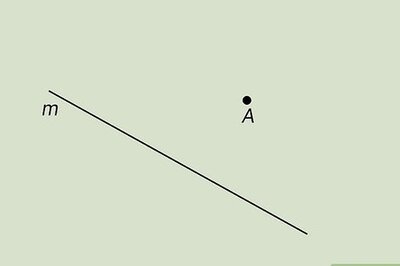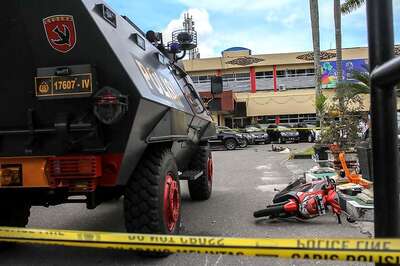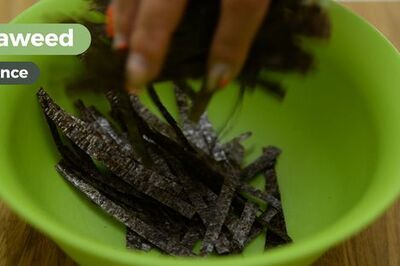
views
Nowpora (Kulgam): In his late 40s, Mohammad Maqbool Bhat didn’t go to work in the fields on Monday. Instead, he went straight to the polling booth in his village Nowpora, an off-track hamlet in Kulgam district of south Kashmir, and spent the entire day sitting outside the booth set in a school building.
He was accompanied by over two dozen other villagers -- some were his age, a few older and many young boys. But none of these people had gone there to vote in the Lok Sabha elections. While most of them had voted in the 2014 Lok Sabha polls, on Monday, they just wanted to see who would turn up to vote by keeping a close eye on the booth entrance.
One of the prime candidates this time —Mehbooba Mufti, the former chief minister of the state and the president of People Democratic Party(PDP)—was born in Nowpora village. Her maternal grandparents lived here and she took her first baby steps in this very place.
Two polling booths were set up in a school building and of the 1,270 voters, only 74 exercised their right, which makes for a mere 5.8 per cent turnout.
In 2014, about 90% polling was recorded in the village.
“Of the total 920 votes, 820 votes were polled. There was a long queue of people enthusiastically waiting to cast their vote,” recalled Aamir Ahmad, the polling agent of a party in 2014 as well as this Lok Sabha elections. “But today, the polling booth was desolate. People came to vote with their faces hidden,” Ahmad said.
One woman in her 30s, in fact, came to vote after leaving her house on the pretext of fetch drinking water from a nearby tube well. Standing in the queue while carrying a water vessel, she told News18: “I don’t want to be seen as someone who cast the vote. This is considered shameful in my village now. People will look down upon me and my family.”
But what changed from 2014 to 2019?
Kashmir was seething after the killing of militant commander Burhan Wani in July 2016. Protests erupted in the remote and far-flung areas of the Valley and clashes with the armed forces resulted in deaths of over one hundred people. Most of these killings took place in south Kashmir.
About two months after the killing of Wani, Rasik Ahmad and another youth from Nowpora had gone to participate in a protest rally. Clashes erupted and many people, including Rashik, were injured. He was shifted to Srinagar where he succumbed to his injuries after a few days.
Rasik’s family said they had voted in the 2014 Lok Sabha elections and that Rasik was a PDP worker. “In 2014, Rasik participated in the PDP rallies and also cast his vote,” said his cousin. But the village was taken aback when he was killed. Not just that, the villagers remember how forces fired indiscriminate teargas shells on the day of his funeral.
“They chocked us with teargas. Pellets were fired. Our women were beaten inside their houses,” said Abdul Majeed, Rasik’s uncle.
The villagers blame Sartaj Madni, senior PDP leader and Mufti’ uncle, for the village incident on the day of Rasik’s funeral.
“We were Sartaj Madni’s supporters but it was on his behalf that our people were beaten,” alleges Majeed as people around nod in agreement. “These people come to power and then kill us. Is this why we vote?” asks Majeed.
The second killing in the village took place in 2018 after the army allegedly fired at a youth in the village. “The army used to visit the village regularly and harass young boys. They would summon them to the army camp and snatch their phones,” said Majeed.
Once when the army men visited the village, the locals started hurling stones at them, and in retaliation, the army allegedly opened fired, killing Aijaz Ahmad, who was in his mid-twenties, on the spot.
“At Aijaz’s funeral, we announced that those who vote in the next elections will be considered enemies of this village,” said Mohammad Maqbool. “I think the blood of our youth is on our hands because of we voted in the past and elected these politicians who are making a life by getting our youth killed,” he added.
In Kulgam district, which is part of the Anantnag parliamentary constituency and where the polls are taking place in three phases, about 10.32 per cent polling was recorded this time.
While the Pulwama attack in south Kashmir brought India and Pakistan to a war-like situation, Nowpora, the village where former chief minister Mehbooba Mufti was born, explains the crisis and the mood on the ground during the ongoing Lok Sabha elections.



















Comments
0 comment